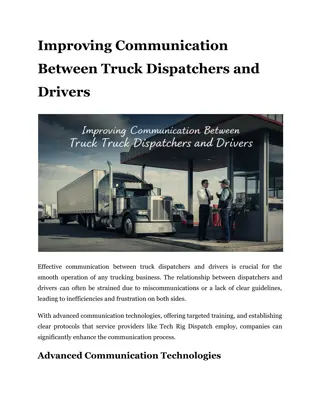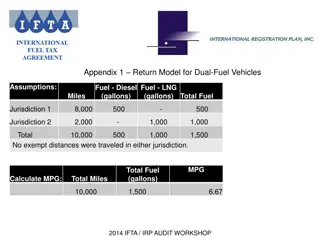
The Impact of Truck Dispatchers on Reducing Empty Miles and Increasing Profitability
Discover how skilled truck dispatchers minimize empty miles, improving efficiency and increasing fleet profitability.
Download Presentation

Please find below an Image/Link to download the presentation.
The content on the website is provided AS IS for your information and personal use only. It may not be sold, licensed, or shared on other websites without obtaining consent from the author. If you encounter any issues during the download, it is possible that the publisher has removed the file from their server.
You are allowed to download the files provided on this website for personal or commercial use, subject to the condition that they are used lawfully. All files are the property of their respective owners.
The content on the website is provided AS IS for your information and personal use only. It may not be sold, licensed, or shared on other websites without obtaining consent from the author.
E N D
Presentation Transcript
The Impact of Truck Dispatchers on Reducing Empty Miles and Increasing Profitability In the intricate web of logistics and transportation, truck dispatchers play a pivotal role that often goes unrecognized by those outside the industry. These professionals are the masterminds behind the efficient movement of goods across highways and byways, ensuring that trucks are not just moving, but moving smartly. The impact of effective truck dispatching extends far beyond simply getting a vehicle from point A to point B; it's about optimizing every mile driven and every minute spent on the road. Empty miles are more than just a waste of fuel; they represent lost opportunities, increased wear and tear on vehicles, and a significant drain on a company's bottom line. By strategically planning routes, consolidating loads, and leveraging their network of contacts, a truck dispatcher can dramatically reduce these unproductive miles. Their role in increasing profitability is multifaceted. It involves a delicate balance of maximizing load efficiency, minimizing downtime, ensuring regulatory compliance, and maintaining customer satisfaction. Through their efforts, dispatchers can turn potential losses into gains, transforming what could be empty journeys into profitable hauls.
The Strategic Role of Truck Dispatchers They are the strategic planners of the transportation industry. Their responsibilities encompass: Route optimization Load planning and consolidation Real-time problem-solving Driver management and support Customer communication These professionals use their expertise and tools to make decisions that ripple throughout the entire supply chain. By effectively managing these aspects, dispatchers can significantly reduce empty miles and boost profitability. Read More Articles: How Technology is Transforming the Truck Dispatching Industry? Route Optimization: The Foundation of Efficiency One of the primary ways truck dispatchers combat empty miles is through meticulous route planning. This involves: Analyzing historical data to predict traffic patterns Considering weather conditions and road construction Coordinating multiple pickups and deliveries along a single route Tech Rig Dispatch employs advanced algorithms to assist dispatchers in creating the most efficient routes possible. With the help of optimizing routes, dispatchers can: Reduce fuel consumption Decrease wear and tear on vehicles Improve on-time delivery performance Load Planning and Consolidation Effective truck dispatch goes beyond simply assigning loads to available trucks. It involves strategic load planning and consolidation to maximize the utilization of cargo space. Dispatchers work to: Combine partial loads going in the same direction
Arrange for backhauls to minimize empty return trips Coordinate with shippers to optimize loading and unloading schedules This level of planning requires a deep understanding of: Cargo types and compatibility Weight distribution and legal load limits Timing constraints for pickups and deliveries Real-Time Problem-Solving: Adapting to the Unexpected The transportation industry is fraught with unpredictability. Weather changes, traffic incidents, and mechanical issues can all throw a wrench into the best-laid plans. This is where the real-time problem-solving skills of specialists become invaluable. Dispatchers must be adept at: Quickly rerouting trucks to avoid delays Finding last-minute loads to fill unexpected capacity Coordinating with maintenance teams for swift repairs By effectively managing these unexpected situations, dispatchers can: Minimize idle time Reduce the impact of disruptions on scheduled deliveries Take advantage of sudden opportunities to fill empty miles Leveraging Technology for Enhanced Dispatch It is increasingly reliant on advanced technologies. Modern dispatchers utilize: GPS tracking systems Real-time traffic monitoring tools Digital load boards and freight matching platforms These technologies enable dispatchers to: Monitor truck locations and progress in real-time Identify potential backhaul opportunities quickly Make data-driven decisions for route adjustments
The Human Element: Building Relationships While technology plays a crucial role, the human element of trucking dispatch remains irreplaceable. Successful dispatchers excel at: Building strong relationships with drivers Maintaining open lines of communication with shippers and receivers Networking with other industry professionals These relationships are vital for: Securing preferential loading and unloading times Finding reliable partners for collaborative shipping arrangements Gaining early access to upcoming load opportunities One of the most delicate aspects of truck dispatching is balancing the need for efficiency with driver satisfaction. Skilled dispatchers understand that: Happy drivers are more productive drivers Excessive empty miles can demoralize drivers and lead to turnover Well-rested drivers are safer and more efficient To achieve this balance, dispatchers focus on: Creating schedules that maximize driving time within legal limits Finding loads that align with drivers' preferences and home time needs Providing support and recognition for drivers' efforts Read More Articles: Top Skills Every Successful Truck Dispatcher Should Have Measuring the Impact: Key Performance Indicators To truly understand the impact of effective dispatching on reducing empty miles and increasing profitability, companies must track key performance indicators (KPIs). These may include: Empty mile percentage Revenue per mile On-time delivery rate Fuel efficiency Driver satisfaction scores
By monitoring these metrics, companies can: Identify areas for improvement in their dispatch operations Recognize and reward high-performing dispatchers Make data-driven decisions for strategic planning Regular analysis of these KPIs allows companies to quantify the value that skilled dispatchers bring to their operations. Wrapping Up the Dispatcher's Crucial Role Companies that invest in skilled dispatchers and provide them with the tools and support they need will be well-positioned to thrive in an increasingly competitive market. By minimizing empty miles and maximizing efficiency, truck dispatchers do more than just move goods from one place to another they drive the profitability and success of the entire transportation industry. At Tech Rig Dispatch, our innovative platform combines advanced algorithms with industry expertise to revolutionize your fleet management. From real-time route adjustments to strategic load planning, we ensure your fleet runs at peak efficiency. So, don't let outdated methods hold you back, and join the ranks of successful carriers who have transformed their operations with Tech Rig Dispatch! Site Article: The Impact of Truck Dispatchers on Reducing Empty Miles and Increasing Profitability






















